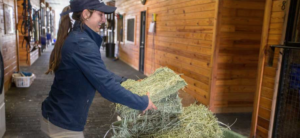 How Much Hay To Feed Horses: Where To Begin. Horses thrive on diets rife with forages, whether it is a medley of pasture grasses, baled hay, or another forage product, such as hay cubes, hay pellets, or haylage. They are capable of processing huge quantities of forage to meet their nutritional demands, but where does a horse owner start in determining how much forage to feed?
How Much Hay To Feed Horses: Where To Begin. Horses thrive on diets rife with forages, whether it is a medley of pasture grasses, baled hay, or another forage product, such as hay cubes, hay pellets, or haylage. They are capable of processing huge quantities of forage to meet their nutritional demands, but where does a horse owner start in determining how much forage to feed?
An estimate can be made based on the horse’s age, body weight, and physiologic state. Here’s a quick reference table to illustrate expected forage consumption by horses.
Forage Consumption:
|
Class of horse |
Amount of forage, percent of body weight |
Forage, percent of diet |
|
Maintenance |
1.0-2.0 |
50-100 |
|
Pregnant mare |
1.0-2.0 |
50-85 |
|
Lactating mare (early) |
1.0-2.5 |
33-85 |
|
Lactating mare (late) |
1.0-2.0 |
20-60 |
|
Weanling |
0.5-1.8 |
30-65 |
|
Yearling |
1.0-2.5 |
33-80 |
|
Performance horse |
1.0-2.0 |
33-80 |
Using the information in the table, let’s work through an example: suppose you have a new mature gelding in your care. He’s going to be a walk-trot trail horse once or twice a week. The weigh-tape estimates his weight to be 1,150 lb (520 kg). Based on his future workload, he would be classified as a maintenance horse or a low-level performance horse.
“Using the table, we would estimate that this gelding should consume 1.0-2.0% of his body weight in good-quality forage per day, which would be about 11.5-23 lb (5.2-10.5 kg),” explained Catherine Whitehouse, M.S., a nutritionist with Kentucky Equine Research.
If forage constitutes his entire diet (and he receives no other feedstuff, such as a concentrate), he should be at the upper end of that range, Whitehouse said.
While a forage-feeding program can begin with just this information, feeding horses is part science and part art. Fine-tuning the diet may be required, as multiple factors have a role in determining forage intake.
Forage Intake Factors:
-
Forage quality. High-quality hays contain more calories and more nutrients, so more or less can be fed based on a horse’s nutritional needs;
-
Forage selection for the individual horse. All horses deserve hay that is free of dust, mold, and other impurities, but not all horses require nutrient-dense hays; others need average hay. This is largely based on metabolism (easy vs. hard keepers); and
-
Digestive-health concerns. Horses are meant to chew on forage for much of the day; not doing so can cause gastrointestinal problems, including gastric ulcers.
All-forage diets do not contain optimal levels of vitamins and minerals, so it is important to supplement with a suitable product.
Baffled about How Much Hay To Feed Horses? Contact us at J & J Hay Farms by clicking here!
Resources:
Article by: Kentucky Equine Research
